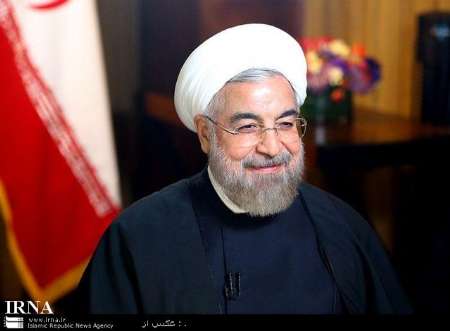ID :
342543
Thu, 09/25/2014 - 13:12
Auther :
Shortlink :
https://oananews.org//node/342543
The shortlink copeid
Supporters Of Violence Fail Anti-terror Leadership: Rouhani

New York, Sept 25, IRNA – President Hassan Rouhani said those who encourage violence are not entitled to lead the coalition against terrorism and urged the world community to join the people of Iraq and Syria in their fight against the terrorist group Islamic State in Iraq and the Levant (ISIL, also known as Daesh).
Addressing researchers and reporters at the New America Foundation in New York on Wednesday, he also cautioned that Daesh cannot be eradicated by military action and that any fight against extremism will succeed only in accordance of international norms and rules.
In his opening remarks, he called for assisting the governments of Syria and Iraq to safeguard their sovereignty and national unity and to guarantee the success of the fight against terrorism saying that international action was required to stop transfer of arms and funds to terrorists.
The president lashed out at the countries that supported terrorist groups in Syria and are now trying to meet their ends through the use of force which he said was "neither plausible nor helpful".
"Those who planted the seeds of violence, infringed the rights of peoples and resorted to force in facing complex political and social issues, are not entitled to lead the coalition against the terrorist groups."
Rouhani who is in New York to take part at the 69th UN General Assembly session also criticized Western countries for adopting double standards to secure their interests and said, "The West has to acknowledge that the moderate Islamic current is part of the (Middle East) region's reality which cannot be stopped by suppression. Further suppression results in harsher extremism."
To a query, he highlighted the role played by Iran in combating extremism and said, "In the current critical juncture, the Islamic Republic of Iran is taking steps in this direction through intra-regional action which constitutes the most significant condition for a peaceful coexistence."
The Iranian chief executive also referred to the positive policies followed by Tehran to settle the nuclear issue and stressed the illegal and inhuman aspects of the anti-Iran sanctions.
He urged the US officials "not adopt their policies based on the views of the pressure groups" and said, "More significant than the (interim) Geneva agreement, was confirmation of the principle that threat and encounter can be substituted by negotiation and interaction."
To secure a comprehensive agreement, he added, "The other party too has to show the political will and the mutual readiness, so that the historical opportunity which the Iranian nation provided last year will not be spoiled."
Responding to a comment by the New America moderator Farid Zakaria who said there were similarities between Rouhani's statements and the speech of the US President Barack Obama at the UN General Assembly opening, the Iranian President said there was an imperative to focus on the real threats of violence and extremism.
Every leader in the world, he added, agrees that violence cannot be disregarded although some may have differences on the ways to combat it.
To a question on the White House's anti-terror policies, the Iranian president replied, "We are not responsible for America's strategy. Rather, Iran has been from onset determined to fight terrorism."
He reminded the urgent support extended by the people of Iran after a call for assistance from the Iraqi people and government when Daesh attacked Mosul and said, Iran acted based on its duty because it saw no difference among the victims of terrorism from Muslims, Christians, Shiites, Sunnis, Iraqis or Americans.
Rouhani also criticized US officials for supporting certain terrorist groups in Syria in the fight against the Daesh terrorists and asked, "Based on which people's permission, law or international mandate have you decided to do this? The people of Syria should be in the scene and make the decision."
Also replying to a question by the session's moderator on why Iran does not agree on 5,000 as the total number of centrifuges, he said, "All signatories to the NPT enjoy equal rights. Nowhere in the NPT, is there a reference to the number of centrifuges."
He underlined that the practical needs to generate electrical power determine the extent of Iran's nuclear program which is outlined and approved by the government and parliament.
President Rouhani said during last year's telephone conversation, US President Obama also shared with him the view that settlement of the nuclear issue precedes the improvement of relations.
" (But) The Iranian nation has little trust in the opposing government. If we can succeed in one or more issues of cooperation, the view of nations will change and new conditions will emerge."
On differences between US Presidency and Congress about nuclear talks with Iran, Rouhani said, "We are negotiating with the US government. Its problem with Congress is theirs. They have to manage their issues."
Also about differences in Iran on the nuclear agreement, he said, "The government and parliament act on their authorization. A group might have a different view, which is all right. They can express their views within laws."
When finally asked about the arrest of Washington Post's reporter and his wife in Iran, President Rouhani said the case was under review and there was no verdict yet which could be discussed./end





